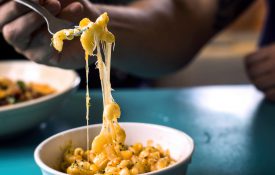-
Wer zuerst kommt, mahlt zuerst (First come, first served)
ORF Austria: Ob man bei einem Vorstellungsgespräch erfolgreich ist oder nicht, hängt nicht nur von der eigenen Leistung ab. Entscheidend ist, wie gut die Kandidaten sind, die sich davor vorgestellt haben. Wer als erster drankommt, hat statistisch bessere Chancen, zeigt eine neue Studie aus den USA. Menschen, die an einem Tag viele ähnliche Entscheidungen treffen müssen, verlieren leicht den Überblick. Sie treffen jede Entscheidung für sich und sind nicht in der Lage, die Konsequenzen der einzelnen Entscheidungen miteinander zu verknüpfen. Dieser Umstand wird in der Psychologie auch als "narrow bracketing" bezeichnet.
-
Facebook Chitchat Is Unforgettable
Science: One day in 2011, a Facebook user professed a love for clean sheets, ending the humble status update with a smiley face. Little did this person realize, the post would inform our understanding of memory. Scientists have found that, when it comes to mental recall, people are far more likely to remember the text of idle chitchat on social media platforms like Facebook than the carefully crafted sentences of books. The researchers happened upon the findings by accident.
-
Train a Parent, Spare a Child
The New York Times: SOMEONE asked me recently what my New Year’s resolution was as a parent. Without thinking, I said, “more creative bribing.” I find the issue of bribing children — or to be more precise, the giving of blunt, uncreative rewards for desired behavior (“If you just stop kicking that seat in front of you on the plane, I’ll give you 10 minutes of iPad time”; “Clean your room this weekend, I’ll give you 10 bucks”; “If you use good manners at Grandma’s house, I’ll let you have an extra brownie”) — to be one of the more nagging challenges of being a parent.
-

People Seek High-Calorie Foods in Tough Times
Bad news about the economy could cause you to pack on the pounds, according to a new study published in Psychological Science, a journal of the Association for Psychological Science. The study shows that when
-
Who Am I? The Heroes of Our Minds
The Huffington Post: One of my guilty pleasures is the TV show Ice Road Truckers, which tells the stories of the heavy haulers who deliver vital supplies to remote Arctic territories of Alaska and Canada. In just two months each year, these truckers make more than 10,000 runs over hundreds of miles of frozen lakes, known as ice roads. We get to share in the treacherous drives -- and just as important, the personal travails -- of the veteran Hugh "The Polar Bear" Rowland, the brash tattooed Rick Yemm, the cold-hating rookie T.J. Wilcox, and former school bus driver and motocross champ Lisa Kelly, one of the rare women to break into this man's world. I'm not alone in this fascination.
-
In the Land of the Free, Interdependence Undermines Americans’ Motivation to Act
Public campaigns that call upon people to think and act interdependently may undermine motivation for many Americans, according to new research published in Psychological Science, a journal of the Association for Psychological Science. Americans are repeatedly exposed to messages urging them to think and act with others in mind, telling us, for example, to act sustainably by bringing reusable bags to the grocery store or to act responsibly by getting a flu shot. Researchers MarYam Hamedani, Hazel Rose Markus, and Alyssa Fu of Stanford University wondered what impact these kinds of appeals have in a culture that stresses independence.

